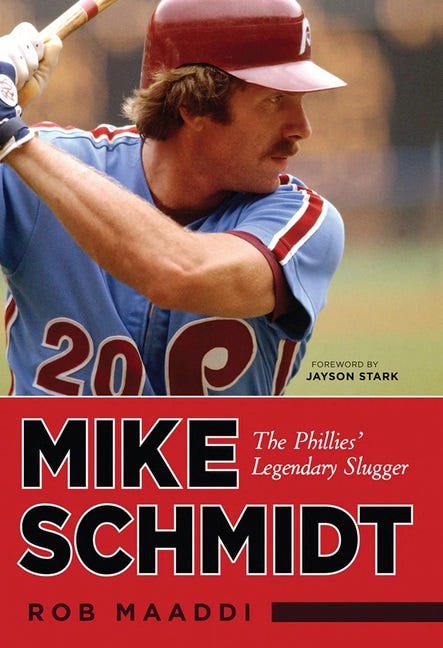Mike Schmidt was the subject of Rob Maaddi’s book, Mike Schmidt: The Phillies' Legendary Slugger, published by Triumph Books in 2010. Jayson Stark penned the foreword.
This was the first of three consecutive re-reads in a row. The primary reason being that the original reviews were forever lost to the internet. It took a bit longer than preferred to read this time around but I was able to read a few chapters at a time, ultimately finishing in the evening on August 30. Ten years ago, I was able to read through several memoirs and biographies while the Olympics were on in the background.
Maaddi’s book on Schmidt was preceded by a biography by William C. Kashatus. Unlike the Kashatus book, Maaddi was able to quote Schmidt from his 2006 book, Clearing the Bases. Unfortunately, Maaddi did not interview Schmidt for the book. However, there’s no shortage of comments from the Hall of Famer thanks to previously published interviews and game recaps. Unless another book comes along, what we have here is a comprehensive and presumably definitive biography of the Hall of Fame third baseman.
As far as teammates or managers are concerned, Maaddi was able to interview Dallas Green, Larry Bowa, and Juan Samuel. As such, readers are able to get an idea of Schmidt’s demeanor and personality. Schmidt could be moody at times, especially after a bad performance. Despite his power numbers, the Philadelphia Phillies fans did not always seem him as a fan favorite. Obviously, their relationship with the man known as Schmitty or Mr. Cool would evolve through the years, especially after the wig incident in 1985. Maaddi’s book isn’t shy about the back and forth between Schmidt and the fans.
Schmidt won three NL MVP Awards (1980, 1981, 1986) during his career along with 12 All-Star selections, 10 Gold Gloves, and 6 Silver Sluggers. His 548 career home runs currently rank 16th all time. In terms of Hall of Fame stats, his 106.9 WAR and 82.8 JAWS ranking makes him the best third baseman in history What makes the 1986 NL MVP Award so fascinating is that he became the second-oldest MVP Award winner at the time. He was 37 years old—Pittsburgh Pirates slugger Willie Stargell was 39 when he tied with Keith Hernandez in 1979.
Gary Carter wasn’t happy about Schmidt taking home the award—Carter’s Mets had won the World Series while Philadelphia didn’t play in the postseason. “I’ve always been told that it would be a player on a winning team,” the future Hall of Fame catcher remarked. Hernandez didn’t have any complaints:
“I’d have voted for Mike Schmidt, too. He put up great numbers and is deserving. He was the most valuable player this year. No player on the winning teams stood out with great statistical years. Anybody else besides Schmidt who thought they had a chance was only fooling themselves.”
How did Schmitty feel at the time?
“This feels like something at the end of a political campaign the way the voting broke down. I feel like a political candidate making his acceptance speech after months and months of campaigning.
Schmidt called it quits on May 28, 1989, when a grounder to third scooted between his legs and loaded the bases. He didn’t wait until getting one last chance to play at Veterans Stadium. Nor did he wait to return to Philadelphia to make it official. The announcement came on the road at Jack Murphy Stadium in San Diego. One day later, he would hold another press conference in Philadelphia. Despite being officially retired, fans still voted Schmidt to play at that season’s All-Star Game. He attended but declined to play.
This is a book that spans Schmidt’s life from his childhood in Dayton, Ohio to his brief gig as a manager with the Clearwater Threshers. The Hall of Fame came calling in 1995 with 96.5% of the vote. It is not an understatement to say that it was a sea of red in the Cooperstown crowd with an estimated 28,000 attending. It was a special day for Phillies fans as Richie Ashburn was elected by the veterans. There was a while where Schmidt considered playing on the Senior PGA Tour. Anyway, it would not be a book on Michael Jack Schmidt without discussing his 500th career home run or the 1980 World Series championship. Maaddi also explores Schmidt’s relationships with teammates Pete Rose, Dick Allen, Garry Maddox, and Tug McGraw.
If you’re a Phillies fan or baseball fan, Mike Schmidt: The Phillies' Legendary Slugger is a must-read.




